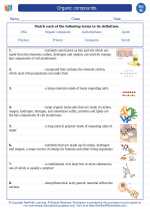Mendelian Inheritance
Mendelian inheritance refers to the inheritance of traits according to the principles proposed by the Austrian monk Gregor Mendel in the 19th century. These principles form the basis of classical genetics and provide a framework for understanding how traits are passed from one generation to the next.
Mendel's Experiments
Mendel conducted his famous experiments on pea plants, where he studied the inheritance of traits such as flower color, seed shape, and plant height. Through carefully controlled breeding experiments, he observed patterns of trait inheritance that led to the formulation of his laws of inheritance.
Mendel's Laws
- Law of Segregation: This law states that each individual has two alleles for each trait, and these alleles segregate during the formation of gametes, so that each gamete carries only one allele for each trait.
- Law of Independent Assortment: This law states that the inheritance of one trait is independent of the inheritance of other traits, provided that the genes responsible for the traits are located on different chromosomes.
Key Concepts
There are several key concepts to understand in Mendelian inheritance:
- Alleles: Different versions of a gene that can lead to different observable traits.
- Dominant and Recessive Alleles: Dominant alleles mask the expression of recessive alleles in heterozygous individuals.
- Genotype and Phenotype: Genotype refers to the genetic makeup of an organism, while phenotype refers to its observable traits.
- Punnett Squares: A tool used to predict the possible genotypes and phenotypes of offspring from a genetic cross.
- Monohybrid and Dihybrid Crosses: Monohybrid crosses involve the inheritance of a single trait, while dihybrid crosses involve the inheritance of two different traits.
Study Guide
To study Mendelian inheritance effectively, you should focus on the following areas:
- Understand the difference between genotype and phenotype, and be able to identify them in given examples.
- Practice using Punnett squares to predict the outcomes of genetic crosses for monohybrid and dihybrid traits.
- Learn to recognize the patterns of inheritance for dominant and recessive traits, and how they are passed from parents to offspring.
- Explore real-world examples of Mendelian inheritance in humans and other organisms, such as the inheritance of genetic disorders.
- Review and understand Mendel's laws of segregation and independent assortment, and how they apply to genetic inheritance.
By mastering these concepts and skills, you will have a solid understanding of Mendelian inheritance and its importance in the field of genetics.
[Mendelian Inheritance] Related Worksheets and Study Guides:
.◂Science Worksheets and Study Guides Eighth Grade. Organic compounds
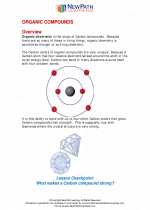
 Worksheet/Answer key
Worksheet/Answer key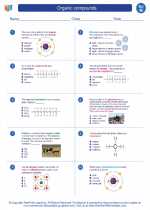
 Worksheet/Answer key
Worksheet/Answer key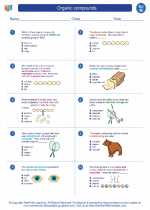
 Worksheet/Answer key
Worksheet/Answer key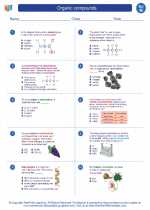
 Vocabulary/Answer key
Vocabulary/Answer key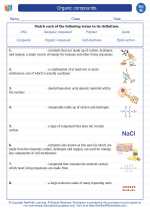
 Vocabulary/Answer key
Vocabulary/Answer key